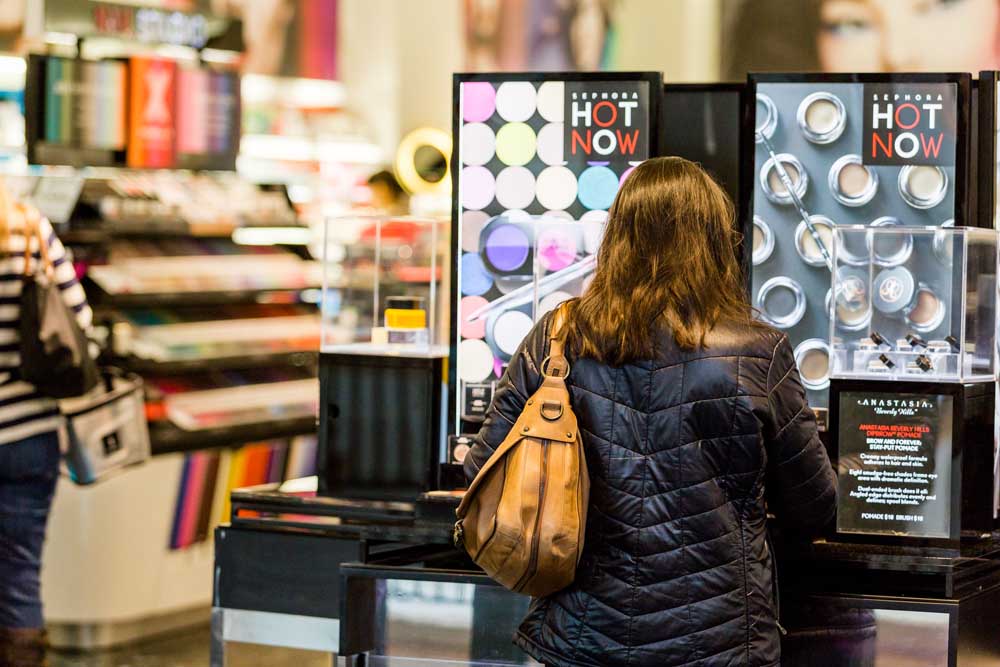Target and Macy’s update makeup offerings
Published 12:00 am Wednesday, May 30, 2018

- A customer shops in a Denver mall Sephora in 2014. More consumers are choosing specialty makeup stores in recent years.(123RF)
Blame the selfie, if you will, but there’s plenty of cash at stake in the battle for the dollars consumers spend on their faces.
In recent years, it’s a battle specialty beauty retailers seem to be winning. Bolingbrook, Illinois-based Ulta Beauty cracked the Fortune 500 earlier this week and continues to open roughly 100 new stores each year, while French chain Sephora continues to win market share, according to parent company Louis Vuitton Moet Hennessy.
Department stores and mass merchants are pushing back with changes that will leave them looking a little more like their specialty rivals, including hiring more beauty-focused employees, shaking up their selection of brands and encouraging shoppers to experiment with new looks using real products or virtual try-on technology.
Giselle Jaramillo, 28, of Chicago, said she prefers Ulta and Sephora because they have a wider selection of the brands she likes.
Brands aren’t the only difference. Caroline Lupetini, 21, of Western Springs, Illinois, said she finds the employees more knowledgeable at specialty chains and the shopping experience more comfortable.
The overall U.S. beauty market, including sales of personal care products as well as cosmetics and skin care items, grew relatively slowly in 2017, up about 1.4 percent over 2016, according to market research firm Mintel. But the category’s attractiveness to retailers isn’t just about sales dollars — customers tend to be loyal, and many prefer to shop for beauty products in stores, where they can try out products before purchasing.
In 2012, department stores drew 19.3 percent of U.S. makeup and nail product sales, while specialty beauty chains got 16.5 percent, according to Euromonitor International. Five years later, those standings flipped: The beauty specialists drew 21.9 percent of sales last year, while department stores’ share slipped to 15.9 percent.
Those figures don’t include purchases from bricks-and-mortar retailers’ websites.
Traditionally, department store cosmetics employees worked at counters devoted to particular brands, while specialty stores were more likely to let customers try out products on their own or get help from employees who didn’t specialize in a certain brand.
“They’ve carved out this niche where the whole store is interactive and consumers are encouraged to play with products to eliminate that risk barrier of purchasing a higher-priced product,” said Alison Gaither, Mintel’s beauty and personal care analyst.
Specialty stores benefited from carrying a mix of budget-friendly and upscale products and brands customers could only find in their stores, she said.
But department stores, mass merchants and drugstores have noticed, Gaither said.
Macy’s says it’s making changes to its cosmetics department designed to let customers pick the experience they prefer. The department store still will have its traditional brand counters, but it is adding new displays where customers can try out products on their own.
The Cincinnati-based chain also is training employees across brands so that even those working at a brand’s counter can help customers with a wider range of products.
CEO Jeff Gennette described it as a shift from a “brand-centric model to a customer-centric model” during a February call with analysts.
Mass merchants also are trying to look a little more like their specialty competitors.
Last year, Target updated the beauty department in 75 stores and is bringing the changes to 350 more this year. Those locations will have a counter where shoppers can chat with a beauty expert and try on products as well as more open shelving, rather than the traditional aisles.
Every store now has a Target employee specifically dedicated to the beauty department, rather than moving between departments, she said.
Target also is bringing in new beauty brands, including some designed for men and shoppers with a wider range of skin tones. The retailer invited 10 beauty brands, including Chicago-based men’s skin care brand Oars + Alps, to be part of its startup accelerator program this spring.
Specialty retailers like Ulta and Sephora still lead when it comes to giving customers the best experience, but there are reasons to think other retailers can win back shoppers, Mintel’s Gaither said.
About 39 percent of women between ages 18 and 24 surveyed by Mintel last year said they had shopped at Ulta in the past year, and 34 percent said they’d shopped at Sephora. But an even larger share — 68 percent — said they had bought from mass merchandisers like Target or Walmart, in part because those retailers have a broader bricks-and-mortar reach, Gaither said.
If those retailers can give customers an experience akin to the specialty chains, “consumers may not feel they have to make an hourlong drive to Sephora to play with products,” she said.






